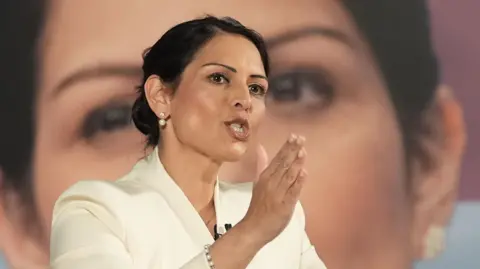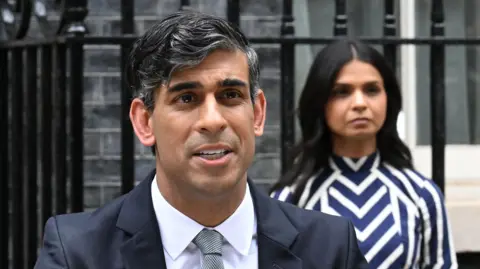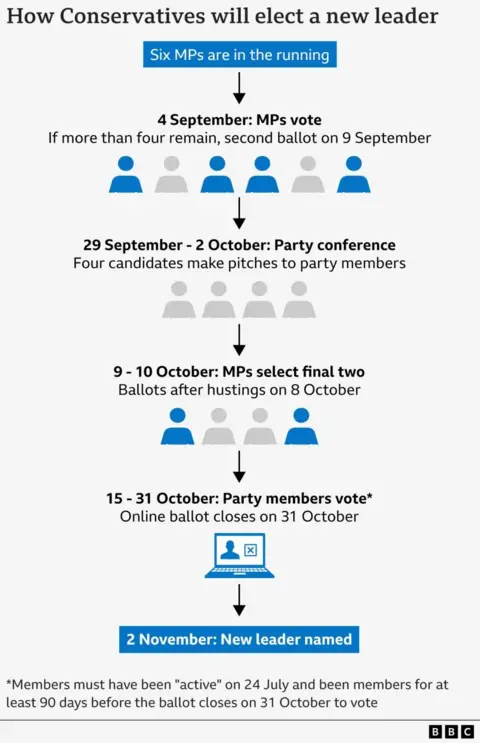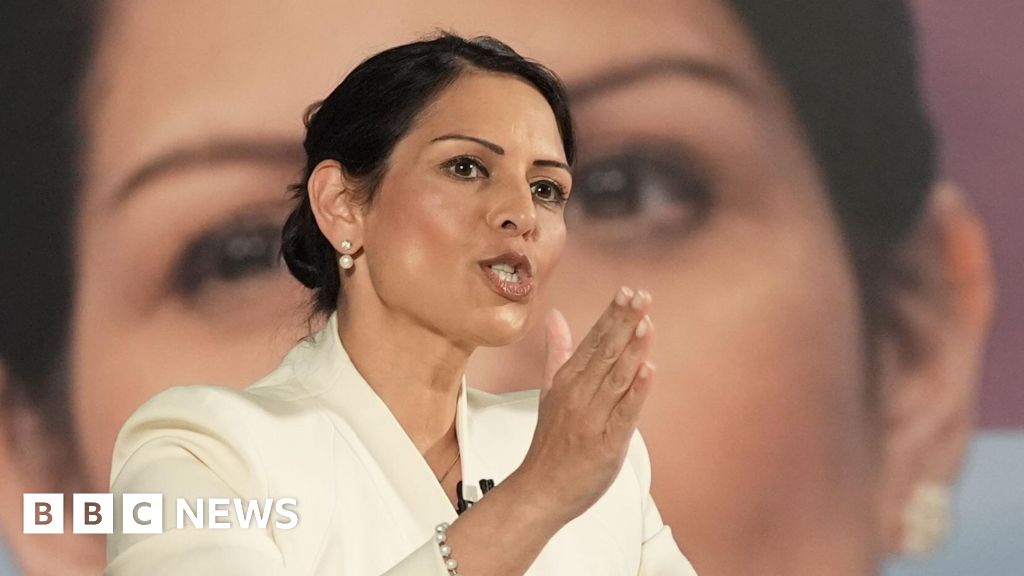 BBC
BBCFormer cabinet minister Priti Patel has been knocked out of the Conservative leadership contest in the first round of voting by Tory MPs.
The former immigration minister Robert Jenrick topped the poll of MPs with 28 votes followed by Kemi Badenoch on 22 votes.
Third was James Cleverly with 21, fourth was Tom Tugendhat with 17, fifth was Mel Stride with 16 and last was Dame Priti on 14.
Voting will continue in the coming weeks until there are two candidates left, leaving party members to pick one of them to be the new leader.
The winner will replace Rishi Sunak, who stood down as party leader after leading the Conservatives to their worst performance at a general election in July.
Another vote will be held next Tuesday to whittle the field down to four candidates before the party’s annual conference at the end of September.
An intensive round of hustings and multiple votes will follow the conference from 8 October, lasting three days, until only two candidates are left.
Conservative Party members will then choose which of the final two candidates they want as the new leader, with the result announced on 2 November.
The leadership hopefuls thanked their supporters in posts on social media.
Mrs Badenoch, who is topping polls of Tory members, claimed the result of the first round of voting showed there was “huge support” for her campaign.
Mr Cleverly claimed “momentum” was on his campaign’s side and said only he could “unite our party with Conservative values”.
Mr Tugendhat said he was “ready to serve, lead and act to make Britain a better place” and paid tribute to Dame Priti, calling her a “brilliant Conservative”.
A few dozen Conservative MPs gathered in a Parliamentary committee room for the result of the first ballot, their numbers much depleted following July’s election defeat.
As the home secretary in former Prime Minister Boris Johnson’s government, Dame Priti developed a reputation as a law-and-order Conservative.
Known for her tough stance on immigration, Dame Priti spearheaded the Conservative government’s flagship scheme to send some asylum seekers to Rwanda.
In her leadership campaign, she promised to unite the party, get it match fit for the next general election, and give members a greater voice.
In a message thanking her supporters, Dame Priti said “we must ensure the membership has a greater role in the running of our party”.
She wished her fellow candidates well with the rest of the leadership campaign but did not endorse any of them.
The remaining five candidates will be vying for the votes of MPs who backed Dame Priti in this round of the contest.
Some Tory MPs told the BBC they felt Mr Cleverly performed better than expected in this round and Mr Tugendhat a little below expectations, although his team insist they’re not disappointed.
Many MPs have not gone public with their preference at this stage – possibly to avoid antagonising the eventual winner and new leader of the party.
The Conservatives have held several of these contests in recent years and one MP who has taken part in many of them was keen to warn journalists against making predictions, describing his colleagues as the “most duplicitous electorate you could find”.

Six Conservatives entered the contest to succeed Mr Sunak over the summer.
In August, Mr Jenrick said the Conservatives could win the next general election but needed to “confront some hard truths”.
Mr Jenrick is attempting to appeal to Reform UK voters with promises to control the UK’s borders and reduce immigration.
Mr Stride has positioned himself as a steady hand who can restore the credibility of the Conservative Party after its historic defeat in the general election.
The former work and pensions secretary believes he can unite the party to win back the public’s trust.
The three remaining contenders launched their leadership campaigns in London this week.
Mrs Badenoch said her party needed to “stop acting like Labour” to win back power at her leadership launch on Monday.
She said that to win back the trust of the public the Tories “can’t just sit around pointing out how terrible Labour are” and “having the same policy arguments of the last Parliament”.
In his opening pitch for the leadership, Mr Cleverly called for his party to “think and act like Conservatives again” and embrace a smaller role for the state.
A former home secretary, Mr Cleverly has pledged to bring back the Rwanda scheme if he is elected next Conservative leader and prime minister, albeit in a different form.
Mr Tugendhat’s offer has been focused on defence and immigration, as he attempts to woo MPs on the right of his party.
The former security minister said he was willing to leave the European Convention on Human Rights (ECHR) if it prevented the government from deporting foreign criminals and he was unable to reform it.


